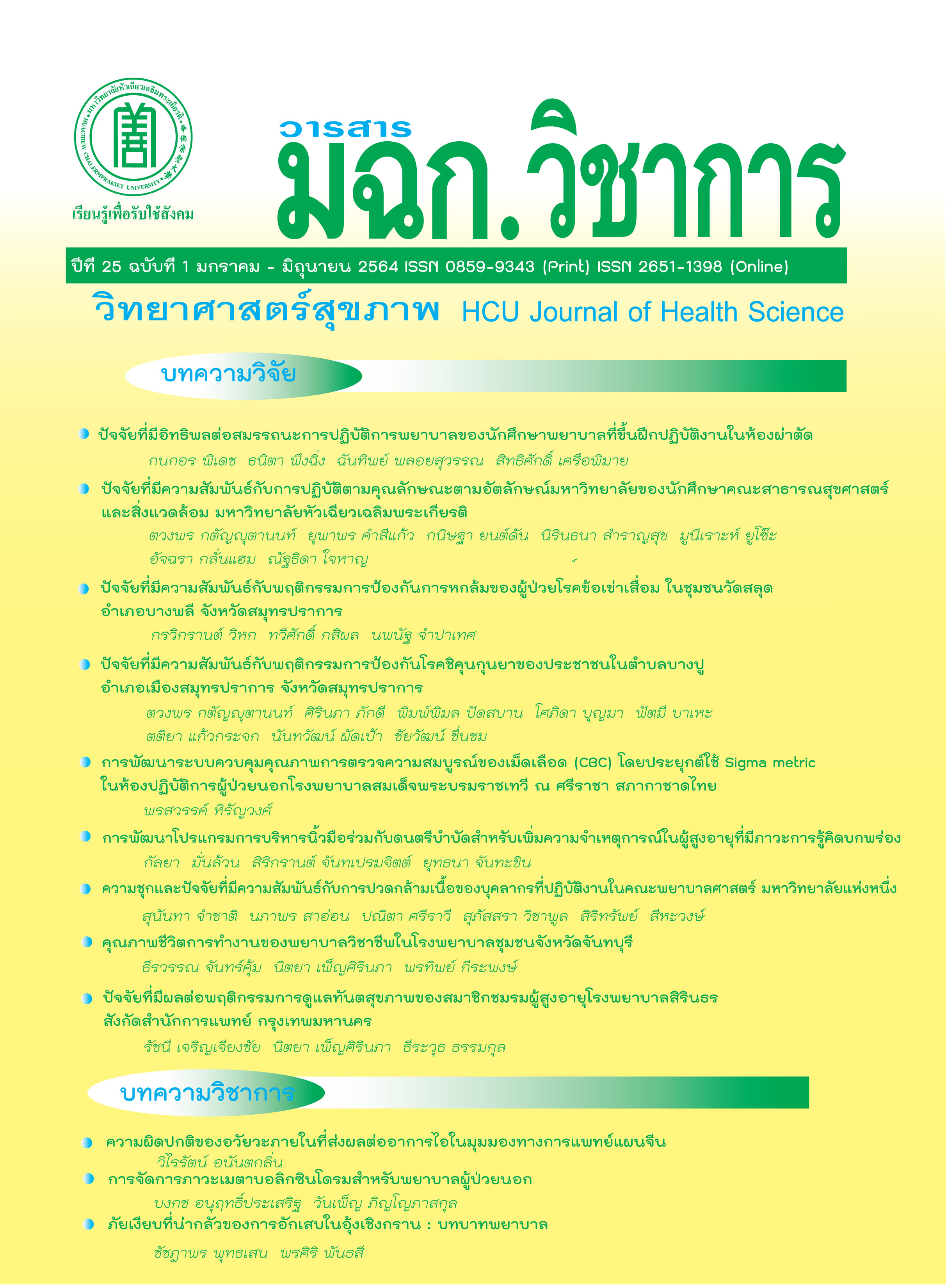The Effect of the Senior Schooling Program to Increase the Happiness Level Among the Elderly Living in Muen Wai Sub-district, Mueang District, Nakhon Ratchasima Province
Keywords:
Senior school, happiness, agingAbstract
This quasi–experimental pretest-posttest with control group research design examined the effect of senior schooling program to increase the happiness level among the elderly living in Mueang District, Nakhon Ratchasima Province. The samples of the research were randomly selected, compromising 70 elderlies. They were divided into two groups consisted of 35 participants in the experimental group and another 35 in the control group. The research tools were senior schooling program, that the experimental group have to join activities once a week for 18 weeks, and the Thai Mental Health Indicator Version 2007 (TMHI-55). All research instruments were validated for content validity by professional experts. Data were analyzed using descriptive statistics, paired sample t-test and independent t-test.
The research findings found as follows: 48.5 percent of the experimental group had a poor level of happiness and 57.1 percent of the control group had a fair level of happiness. The mean score of happiness of the elderly in the experimental group after participating in the senior schooling program was significantly higher prior to the experiment at .05 level of significance. Also, the mean score of happiness of the elderly in the experimental group after participating in the senior schooling program was significantly higher than the control group at .05 level of significance. The results of this study suggested that this program could support the elderly to participate in physical, mental, social and environmental health promotional activities. Consequently, the senior schooling program is effective for increasing the level of happiness among the elderly. Therefore, such program should be continuously implemented in other communities to promote elderly happiness.
Downloads
References
2. ปัทมา ว่าพัฒนวงศ์, ปราโมทย์ ประสาทกุล. ประชากรไทยในอนาคต. [อินเทอร์เน็ต]. 2561. [เข้าถึงเมื่อ 3 มกราคม 2561] เข้าถึงจากhttp://www.ipsr.mahidol.ac.th/IPSR/AnnualConference/ConferenceII/Article/Article02.htm
3. ประนอม โอทกานนท์. ชีวิตที่สุขสมบูรณ์ของผู้สูงอายุไทย หลักการ งานวิจัย และ บทเรียนจากประสบการณ์. พิมพ์ครั้งที่ 2. กรุงเทพมหานคร: สำนักพิมพ์แห่งจุฬาลงกรณ์มหาวิทยาลัย; 2554.
4. มูลนิธิสถาบันวิจัยและพัฒนาผู้สูงอายุไทย (มส.ผส.). สถานการณ์ผู้สูงอายุไทย ปี พ.ศ.2557. [อินเทอร์เน็ต]. 2557. [เข้าถึงเมื่อ 3 กรกฎาคม 2557] เข้าถึงจาก http://thaitgri.org/?p=36746
5. กรมกิจการผู้สูงอายุ กระทรวงพัฒนาสังคมและความมั่นคงของมนุษย์. แผนผู้สูงอายุแห่งชาติ [อินเทอร์เน็ต]. 2562. [เข้าถึงเมื่อ 3 มกราคม 2561] เข้าถึงจาก http://www.dop.go.th/th/news/1/1607
6. กองส่งเสริมศักยภาพผู้สูงอายุ. คู่มือโรงเรียนผู้สูงอายุ. กองส่งเสริมศักยภาพผู้สูงอายุ กรมกิจการผู้สูงอายุ กรุงเทพมหานคร: 2559.
7. ณัฐกานต์ สำเนียงเสนาะ. ปัจจัยทำนายความสุขของผู้สูงอายุในชุมชนจังหวัดฉะเชิงเทรา. [วิทยานิพนธ์หลักสูตรพยาบาลศาสตรมหาบัณฑิต]: บัณฑิตวิทยาลัย มหาวิทยาลัยบูรพา; 2556.
8. สำนักงานปลัด องค์การบริหารส่วนตำบลหมื่นไวย อำเภอเมือง จังหวัดนครราชสีมา. ทะเบียนผู้สูงอายุ; 2561.
9. Polit, D.F.and Hungler,B.P. Nursing Research : Principles and methods.3rd.ed.Philadelphia: Lippincott. 1987.
10. ชนากานต์ ชมภูนุช และคณะ. ขนาดกลุ่มตัวอย่างในการวิจัยเชิงปริมาณ. เอกสารชุมชนนักปฏิบัติ คณะแพทย์ศาสตร์ ศิริราชพยาบาล กรุงเทพมหานคร: โรงพยาบาลศิริราช; 2554.
11. มหาวิทยาลัยราชภัฏนครราชสีมา. หลักสูตรโรงเรียนผู้สูงอายุ. 2559.
12. อภิชัย มงคล , ยงยุทธ วงศ์ภิรมย์ศานติ์ , ทวี ตั้งเสรี , วัชนี หัตถพนม , ไพรวัลย์ ร่มซ้าย, วรวรรณ จุฑา. รายงานการวิจัย การพัฒนาและทดสอบดัชนีชี้วัดสุขภาพจิตคนไทย(Version 2007) : กรมสุขภาพจิต กระทรวงสาธารณสุข. กรุงเทพมหานคร : โรงพิมพ์ชุมนุมสหกรณ์การเกษตรแห่งประเทศไทย จำกัด; 2552.
13. จุฑาพร แหยมแก้ว. รูปแบบการจัดกิจกรรมผู้สูงอายุในโรงเรียนสร้างสุข ตำบลท้ายดง อำเภอวังโป่ง จังหวัดเพชรบูรณ์. รายงานสืบเนื่องการประชุมสัมมนาวิชาการ(Proceedings) การนำเสนอผลงานวิจัยระดับชาติ เครือข่ายบัณฑิตศึกษา มหาวิทยาลัยราชภัฏภาคเหนือ ครั้งที่ 17. ณ ศูนย์วัฒนธรรมภาคเหนือตอนล่าง วังจันทน์ริเวอร์วิว มหาวิทยาลัยราชภัฏพิบูลสงคราม จังหวัดพิษณุโลก; 2560.
14. พรทิพย์ เกยุรานนท์. “การสร้างความสุขในผู้สูงอายุ” [อินเทอร์เน็ต]. . [เข้าถึงเมื่อ 5 กันยายน 2561] เข้าถึงจาก http://www.stou.ac.th/stoukc/elder/main1_9.html
15. ธิดารัตน์ นวลเดช. การเปรียบเทียบความสุขของผู้สูงอายุในโรงเรียนผู้สูงอายุและในชุมชนเขตเทศบาลเมืองหนองปรือ อำเภอบางละมุง จังหวัดชลบุรี. [วิทยานิพนธ์หลักสูตรรัฐประศาสนศาสตรมหาบัณฑิต สาขาวิชาการบริหารทั่วไป]: บัณฑิตวิทยาลัย มหาวิทยาลัยบูรพา; 2560.
Downloads
Published
How to Cite
Issue
Section
License
บทความที่ได้รับการตีพิมพ์เป็นลิขสิทธิ์ของวารสารวิทยาศาสตร์สุขภาพและสุขภาวะ
ข้อความที่ปรากฏในบทความแต่ละเรื่องในวารสารวิชาการเล่มนี้เป็นความคิดเห็นส่วนตัวของผู้เขียนแต่ละท่านไม่เกี่ยวข้องกับมหาวิทยาลัยหัวเฉียวเฉลิมพระเกียรติ และคณาจารย์ท่านอื่นๆในมหาวิทยาลัยฯ แต่อย่างใด ความรับผิดชอบองค์ประกอบทั้งหมดของบทความแต่ละเรื่องเป็นของผู้เขียนแต่ละท่าน หากมีความผิดพลาดใดๆ ผู้เขียนแต่ละท่านจะรับผิดชอบบทความของตนเองแต่ผู้เดียว




